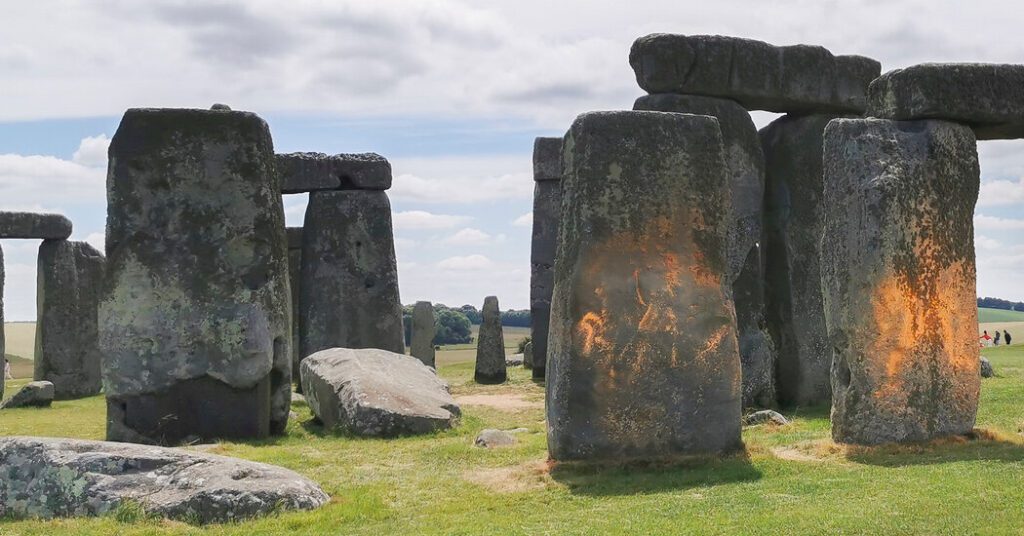Two environmental activists have been arrested in Britain for spraying a monolith at Stonehenge with orange powder to draw attention to the climate impact of fossil fuels.The attack on the prehistoric site came on Wednesday as the stones drew attention as people across the Northern Hemisphere celebrated the arrival of the summer solstice.
The organization that manages the prehistoric site of Stonehenge in England said on Thursday it had removed the bright orange powder ahead of preparations for a big day at the site.
Nick Merriman, chief executive of English Heritage, the charity that looks after Stonehenge, said there appeared to be no visible damage to the stones, but in a statement he said “that is by no means without harm – from the very act of cleaning the stones to the distress caused to people for whom Stonehenge has spiritual significance.”
English Heritage said the powder was quickly removed due to fears it could damage the rare lichens that grow on the ancient stones and cause permanent damage as the coloured powder could streak if exposed to water.
Police in Wiltshire, England, said they had arrested two people after they used a fire extinguisher to spread orange powder at Stonehenge on Wednesday.
Just Stop Oil, a British group that seeks to block new oil and gas licences, said in a statement that it had “decorated” Stonehenge with powder paint and called on the next British government to work with other governments to “end the extraction and burning of oil, gas and coal by 2030”.
The location was chosen to attract as much attention as possible, said Ben Larsen, a Just Stop Oil protester and supporter. “Look at what our ancestors left behind 5,000 years ago, this beautiful monument,” he said in a phone interview. “What are we leaving for our children?”
The summer solstice, which occurred on Thursday, is the longest day of the year in the Northern Hemisphere, with around 17 hours of daylight in most of Britain, and is also an important date in the religious calendar of the spiritual movement known as Druidism.
Every year, thousands of people gather at Stonehenge to watch the short dawn, one of the few days when the rope fence traditionally used to keep people away from the almost 5,000-year-old stones is removed.
Druid Adrian Luke said the vandalism disrupted this year's joyous celebrations. “Some people were very upset personally,” Luke, 66, said in a phone interview. “It's a bit like someone spray painting St. Paul's Cathedral. It means a lot to a lot of people.”
(Luke added that he understood the spirit of the protests, if not the methods.)
Britain's top politicians were quick to condemn the climate protesters. Chancellor Rishi Sunak called the group a “disgrace.” Labour leader Keir Starmer, Sunak's rival in next month's general election, called Just Stop Oil “pathetic.”
The two protesters arrested on Wednesday, a woman in her 20s and a man in his 70s, are facing charges of damaging property, obstructing participation in lawful activities and damaging ancient ruins, which could carry a prison sentence of up to two years.
Protesters and activists have regularly used the Stonehenge site as a demonstration site, but few have garnered as much media coverage as the Just Stop Oil protests.
In recent years, the group has been in the news for its acts of vandalism at museums.
At London's National Gallery, protesters swung hammers at Diego Velázquez's “Venus Roque” and poured a can of tomato soup over Vincent van Gogh's “Sunflowers.”
Also on Thursday, Just Stop Oil protested in other parts of the UK, claiming that two other protesters had covered Taylor Swift's private jet in orange paint at a London airport.
Luke said he plans to celebrate the summer solstice with a small group of friends at a local stone circle in Somerset – a tradition that started after Stonehenge became too crowded.
There's music, drumming and parties at Stonehenge, “which is fine, but my purpose is to see the sunrise,” he said.

